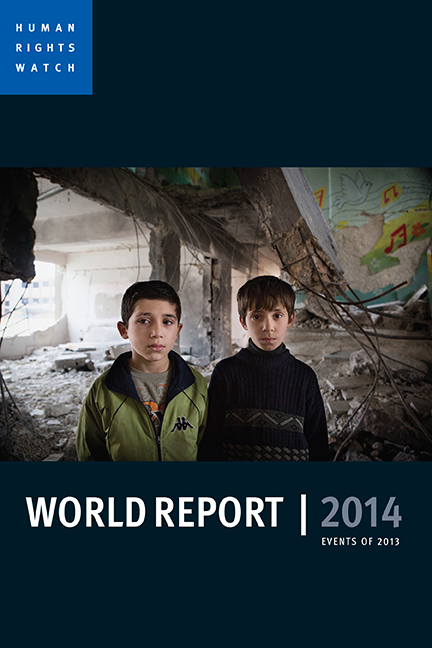Book contents
- Frontmatter
- Dedication
- HUMAN RIGHTS WATCH
- Table of Contents
- Foreword
- Rights Struggles of 2013: Stopping Mass Atrocities, Majority Bullying, and Abusive Counterterrorism
- The Human Rights Case for Drug Reform How Drug Criminalization Destroys Lives, Feeds Abuses, and Subverts the Rule of Law
- Putting Development to Rights: Integrating Rights into a Post-2015 Agenda
- The Right Whose Time Has Come (Again) Privacy in the Age of Surveillance
- Photo Essays
- AFRICA
- AMERICAS
- ASIA
- EUROPE AND CENTRAL ASIA
- MIDDLE EAST AND NORTH AFRICA
- UNITED STATES AND CANADA
- 2013 HUMAN RIGHTS WATCH PUBLICATIONS
- Acknowledgments
Saudi Arabia
Published online by Cambridge University Press: 07 May 2022
- Frontmatter
- Dedication
- HUMAN RIGHTS WATCH
- Table of Contents
- Foreword
- Rights Struggles of 2013: Stopping Mass Atrocities, Majority Bullying, and Abusive Counterterrorism
- The Human Rights Case for Drug Reform How Drug Criminalization Destroys Lives, Feeds Abuses, and Subverts the Rule of Law
- Putting Development to Rights: Integrating Rights into a Post-2015 Agenda
- The Right Whose Time Has Come (Again) Privacy in the Age of Surveillance
- Photo Essays
- AFRICA
- AMERICAS
- ASIA
- EUROPE AND CENTRAL ASIA
- MIDDLE EAST AND NORTH AFRICA
- UNITED STATES AND CANADA
- 2013 HUMAN RIGHTS WATCH PUBLICATIONS
- Acknowledgments
Summary
Saudi Arabia stepped up arrests, trials, and convictions of peaceful dissidents, and forcibly dispersed peaceful demonstrations by citizens in 2013. Authorities continued to violate the rights of 9 million Saudi women and girls and 9 million foreign workers. As in past years, authorities subjected thousands of people to unfair trials and arbitrary detention. In 2013, courts convicted seven human rights defenders and others for peaceful expression or assembly demanding political and human rights reforms.
Freedom of Expression, Association, and Belief
On March 9, the Criminal Court of Riyadh sentenced rights activists Dr. Mohammed al-Qahtani and Dr. Abdullah al-Hamid to 10 and 11 years in prison respectively and lengthy travel bans, after convicting them on charges that included “breaking allegiance with the ruler,” and “setting up an unlicensed organization.” The charges related solely to the men's peaceful human rights advocacy. The verdict also ordered the dissolution of their organization, the Saudi Civil and Political Rights Association (ACPRA). A court in Buraida convicted APCRA activist Abd al-Karim al-Khodr on similar charges in June and sentenced him to eight years in prison.
The Specialized Criminal Court in June sentenced human rights advocate Mikhlif al-Shammari to five years in prison and a 10-year travel ban based on his writings and exposure of human rights abuses. Human rights activists Waleed Abu al-Khair and Fadhel al-Manasef remained on trial at this writing on charges based solely on their peaceful exercise of the rights to free expression and association.
Saudi officials continue to refuse to register political or human rights groups, leaving members subject to prosecution for “setting up an unregistered organization.” In August, an appeals court upheld the Social Affairs Ministry's denial of registration to the Eastern Province-based Adala Center for Human Rights. The ministry said it can only license charitable organizations, and that Adala's activities are not covered under the ministry's definition of a charity.
Saudi Arabia does not tolerate public worship by adherents of religions other than Islam and systematically discriminates against Muslim religious minorities, in particular Twelver Shia and Ismailis.
On February 8, officers from the Committee for the Promotion of Virtue and the Prevention of Vice, or religious police, raided a gathering of around 40 Ethiopian women in al-Khobar on the pretext that it was a Christian religious gathering. Authorities jailed them and deported them in groups, the last in July.
- Type
- Chapter
- Information
- World Report 2014Events of 2013, pp. 600 - 604Publisher: Bristol University PressPrint publication year: 2014

